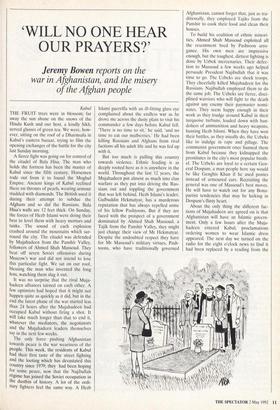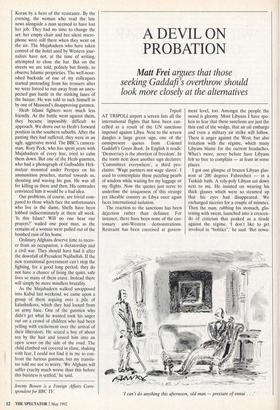`WILL NO ONE HEAR OUR PRAYERS?'
war in Afghanistan, and the misery of the Afghan people
Kabul
THE FRUIT trees were in blossom; far away the sun shone on the snows of the Hindu Kush and our host, a kindly Sikh, served glasses of green tea. We were, how- ever, sitting on the roof of a Dharmsala in Kabul's eastern bazaar, trying to film the opening exchanges of the battle for the city last Sunday morning.
A fierce fight was going on for control of the citadel of Bala Hisa. The man who holds the fortress has been the master of Kabul since the fifth century. Horsemen rode out from it to found the Moghul Empire. Ancient kings of Kabul reclined there on thrones of pearls, wearing armour studded with diamonds. The British used it during their attempt to subdue the Afghans and so did the Russians. Bala Hisa's walls are 12 feet thick. On Sunday, the forces of Hezb Islami were doing their best to level them with heavy mortars and tanks. The sound of each explosion crashed around the mountains which sur- round the city. The citadel was defended by Mujahadeen from the Panshir Valley, followers of Ahmed Shah Massoud. They beat off seven Soviet offensives during Moscow's war and did not intend to lose this particular fight. We sat on our roof, blessing the man who invented the long lens, watching them slug it out.
It was no surprise that the rival Muja- hadeen alliances turned on each other. A few optimists had hoped that it might not happen quite as quickly as it did, but in the end the latest phase of the war started less than 24 hours after the Mujahadeen had occupied Kabul without firing a shot. It will take much longer than that to end it, whatever the mediators, the negotiators and the Mujahadeen leaders themselves say in the next few weeks.
The only force pushing Afghanistan towards peace is the war weariness of the people. This week, the residents of Kabul had their first taste of the street fighting and the looting which has devastated this country since 1979; they had been hoping for some peace, now that the Najibullah regime has joined the Soviet occupation in the dustbin of history. A lot of the ordi- nary fighters feel the same way. A Hezb
lslami guerrilla with an ill-fitting glass eye complained about the endless war as he drove me across the dusty plain to visit his commander a few days before Kabul fell. 'There is no time to sit,' he said, 'and no time to eat our mulberries.' He had been killing Russians and Afghans from rival factions all-his adult life and he was fed up with it.
But too much is pulling this country towards violence. Ethnic feuding is as deeply rooted here as it is anywhere in the world. Throughout the last 12 years, the Mujahadeen put almost as much into clan warfare as they put into driving the Rus- sians out and toppling the government that was left behind. Hezb Islami's leader, Gulbuddin Hekmatyar, has a murderous reputation that has always repelled some of his fellow Pashtoons. But if they are faced with the prospect of a government dominated by Ahmed Shah Massoud, a Tajik from the Panshir Valley, they might just change their view of Mr Hekmatyar. Despite the undoubted respect they have for Mr Massoud's military virtues, Pash- toons, who have traditionally governed
Afghanistan, cannot forget that, just as tra- ditionally, they employed Tajiks from the Panshir to cook their food and clean their houses.
To build his coalition of ethnic minori- ties, Ahmed Shah Massoud exploited all the resentment bred by Pashtoon arro• gance. His own men are impressive enough, but the toughest, dirtiest fighting is done by Uzbek mercenaries. Their defec- tion to Massoud a few weeks ago helped persuade President Najibullah that it was time to go. The Uzbeks are shock troops. They cheerfully killed Mujahadeen for the Russians. Najibullah employed them to do the same job. The Uzbeks are fierce, disci- plined warriors who will fight to the death against any enemy their paymaster nomi- nates. They seem happy enough in their work as they trudge around Kabul in their turquoise turbans, loaded down with ban- doliers of ammunition and heavy weapons, hunting Hezb Islami. When they have won their battles, as they usually do, the Uzbeks like to indulge in rape and pillage. The communist government once banned them from Kabul because they kidnapped the prostitutes in the city's most popular broth- el. The Uzbeks are loyal to a certain Gen- eral Dospam, a man people here say would be like Genghis Khan if he used ponies instead of armoured cars. Recruiting the general was one of Massoud's best moves. He will have to watch out for any Bona- partist tendencies that may be lurking in Dospam's flinty heart.
About the only thing the different fac- tions of Mujahadeen are agreed on is that Afghanistan will have an Islamic govern- ment. Only a few hours after the Muja- hadeen entered Kabul, proclamations ordering women to wear Islamic dress appeared. The next day we turned on the radio for the eight o'clock news to find it had been replaced by a reading from the Koran by a hero of the resistance. By the evening, the woman who read the late news alongside a man seemed to have lost her job. They had no time to change the set: her empty chair and her silent micro- phone were still there when they went on the air. The Mujahadeen who have taken control of the hotel used by Western jour- nalists have not, at the time of writing, attempted to close the bar. But on the streets we are told, politely but firmly, to observe Islamic proprieties. The well-nour- ished backside of one of my colleagues started protruding from his trousers after we were forced to run away from an unex- pected gun battle in the stinking lanes of the bazaar. He was told to tuck himself in by one of Massoud's disapproving gunmen.
Hezb Islami fighters were much less friendly. As the battle went against them, they became impossibly difficult to approach. We drove out to Hezb's forward position in the southern suburbs. After the pasting they had suffered, they were in an ugly, aggressive mood. The BBC's camera- man, Rory Peck, who has spent years with Mujahadeen of every hue, tried to calm them down. But one of the Hezb gunmen, who had a photograph of Gulbuddin Hek- matyar mounted under Perspex on his ammunition pouches, started towards us, shouting and waving his gun. He was all for killing us there and then. His comrades convinced him it would be a bad idea.
Our problems, of course, are trivial com- pared to those which face the unfortunates who live in the slums. Shells have been lobbed indiscriminately at them all week. 'Is this Islam? Will no one hear our prayers?' wailed one poor man, as the remains of a woman 'were pulled out of the bombed ruin of his home.
Ordinary Afghans deserve time to recov- er from an occupation, a dictatorship and a civil war. They should have had it after the downfall of President Najibullah. If the new transitional government can't stop the fighting, for a good long period, they do not have a chance ofliving the quiet, safe lives so many of them crave. Instead theft will simply be more mindless brutality.
As the Mujahadeen walked unopposed into Kabul last weekend, we came upon a group of them arguing over a pile of kalashnikovs, which they had looted from an army base. One of the gunmen who didn't get what he wanted took his anger out on a crowd of children who had been yelling with excitement over the arrival of their liberators. He seized a boy of about ten by the hair and tossed him into an open sewer on the side of the road. The child climbed out covered in slime, shaking with fear. I could not find it in me to con- front the furious gunman, but my transla- tor told me not to worry. 'We Afghans will suffer cruelty much worse than this before this business is settled,' he said.
Jeremy Bowen is a Foreign Affairs Corre- spondent for BBC TV.



















































 Previous page
Previous page